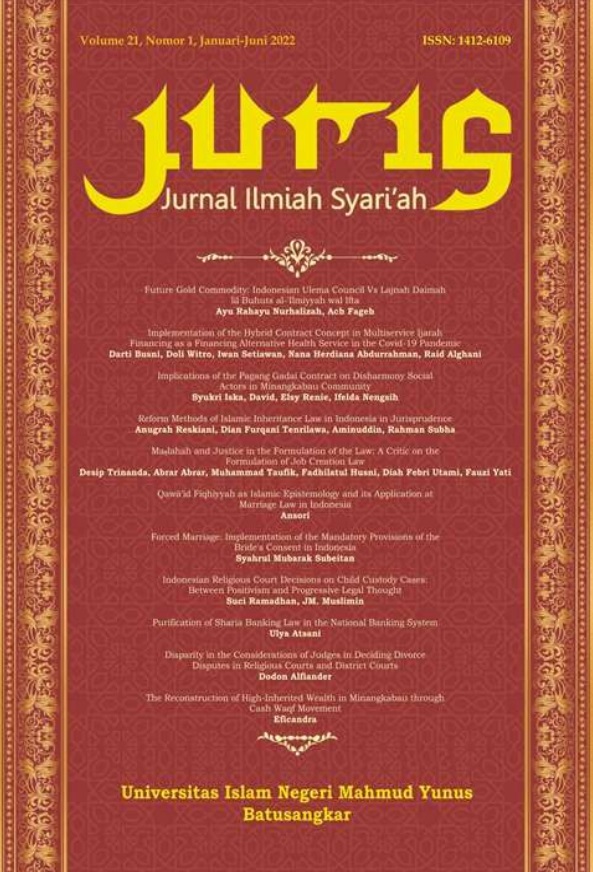Realizing Justice and Maṣlaḥah in E-Commerce: Fiqh Muamalah Insights and Challenges in Malaysia and Indonesia
DOI:
https://doi.org/10.31958/juris.v23i2.12356Keywords:
Justice, Maß?úlaß©Ñah, E-Commerce, Islamic Principles, Consumer Behaviour, Producer BehaviourAbstract
This study explores how fiqh muamalah principles can realise justice and Maṣlaḥah in e-commerce practices, focusing on the understanding and behavior of consumers and producers in Malaysia and Indonesia. The research investigates how these Islamic legal principles are integrated and practised within the digital marketplace. The primary data sources include e-commerce users from Malaysia and Indonesia, specifically consumers and producers. Data were collected through in-depth interviews with various e-commerce users, including consumers and producers. The results reveal that producers generally have a higher awareness of justice and maṣlaḥah in e-commerce, though their application of these principles varies. Consumers' experiences are inconsistent, often influenced by their educational background and exposure to Islamic commerce teachings. Key challenges include the lack of standardized guidelines and divergent interpretations of fiqh muamalah principles. The study underscores the need for more structured education and regulatory frameworks to ensure these principles' effective and consistent integration into e-commerce practices. Recommendations include developing comprehensive training programs and establishing clear guidelines to bridge the gap between understanding and practice, thereby aligning e-commerce practices in Malaysia and Indonesia with fiqh muamalah principles.
References
Adha, S. (2022). Faktor Revolusi Perilaku Konsumen Era Digital: Sebuah Tinjauan Literatur. JIPIS, 31(2), 134–148. https://doi.org/10.33592/jipis.v31i2.3286
Ahmadi, M. A., Eka Wawan, Rofiud, A., Salsabila, D., Elcovano, G., Julian, B., & Indah, F. (2023). Tinjauan Fiqih Muamalah terhadap Jual Beli Online di Era Digital. Al- Iqtishady: Journal of Sharia Economics, 1(2), 52–61. https://ejournal.stainupa.ac.id/index.php/aliqtishady
Alam, S. S., & Yasin, N. M. (2010). The antecedents of online brand trust: Malaysian evidence. Journal of Business Economics and Management, 11(2), 210–226. https://doi.org/10.3846/jbem.2010.10
Alfiani Munawarah, Janah, A. M., Oktarini, E. A., & Khatimah, H. (2022). Peran Ekonomi Digital bagi Perkembangan Pasar Modern Indonesia. Al-Aflah, 1(2), 124–133. https://doi.org/10.23971/al-aflah.v1i2.5876
Atsar, A., & Izuddin, A. (2019). Implementation of fiqh based on the maslahah in murabahah financing in sharia banking. Ijtihad : Jurnal Wacana Hukum Islam Dan Kemanusiaan, 18(1), 119. https://doi.org/10.18326/ijtihad.v18i1.119-136
Azam, I. N. (2021). Peranan Ekonomi Syariah Dalam Perkembangan Digitalisasi Ekonomi Terkait Prospek Marketplace Di Indonesia. Jurnal At-Tahdzib, 9(1), 84–101. https://ejournal.staiat-tahdzib.ac.id/tahdzib/article/view/254
Aziz, A. A., & Hanifah, H. (2020). Shariah-compliant e-commerce in Indonesia: Legal and regulatory frameworks. Journal of Islamic Marketing, 11(2), 321–339.
Baregheh, A., Rowley, J., & Sambrook, S. (2009). Towards a multidisciplinary definition of innovation. Management Decision, 47(8), 1323–1339. https://doi.org/10.1108/00251740910984578
Benner, M. J. (2009). Dynamic or Static Capabilities? Process Management Practices and Response to Technological Change. Journal of Product Innovation Management, 26(5), 473–486. https://doi.org/10.1111/j.1540-5885.2009.00675.x
Chen, X., Shen, J., & Wei, S. (2023). What reduces product uncertainty in live streaming e-commerce? From a signal consistency perspective. Journal of Retailing and Consumer Services, 74(June), 103441. https://doi.org/10.1016/j.jretconser.2023.103441
Hadiyati, E. (2011). Kreativitas dan Inovasi Berpengaruh Terhadap Kewirausahaan Usaha Kecil. Jurnal Manajemen Dan Kewirausahaan, 13(1). https://doi.org/10.9744/jmk.13.1.8-16
Hafid, A., Bahri, S., Marzuki, S. N., Muis, M., & Idayanti, R. (2024). The Application of Khiyar Principles to E-Commerce Transaction: The Islamic Economy Perspective. Samarah: Jurnal Hukum Keluarga Dan Hukum Islam, 8(1), 403. https://doi.org/10.22373/sjhk.v8i1.20890
Hassan, R., & Ali, N. (2020). Government initiatives for the development of e-commerce in Malaysia: A review. International Journal of Business and Management Science, 10(3), 50–65.
Hayati, M., Ayu, D. M., Ewit, Nurva, Marinda, & Sulastri. (2024). Perkembangan Fikih Muamalah Konteks Transaksi Elektronik. Al-Fiqh, 2(1), 18–28. https://doi.org/10.59996/al-fiqh.v2i1.370
Hayati, R. F., Arnes, O. V., & Kirin, A. Bin. (2023). Innovation Of Online Zakat Institutions: Opportunities And Challenges In The Era Of Smart Society 5.0. MILRev : Metro Islamic Law Review, 2(2), 175. https://doi.org/10.32332/milrev.v2i2.8091
Ibrahim, M. H., & Sulaiman, S. (2020). The role of blockchain in enhancing transparency and trust in Islamic finance and e-commerce. Journal of Islamic Finance and Business Research, 8(2), 55–72.
Jafar, W. A. (2019). Undian Berhadiah Alfamart di Kota Bengkulu dalam Perspektif Ekonomi Syari’ah. Al-Istinbath: Jurnal Hukum Islam, 4(1), 1–14. https://doi.org/10.29240/JHI.V4I1.634
Karimuddin, K., Haeqal, M., Efendi, R., Marhadi, M., & Meidina, A. R. (2024). Bank Interest in the Contemporary Era: Problem of Ad’afan Muda’afah Interpretation in Determining Law of Usury. MILRev : Metro Islamic Law Review, 3(1), 43–65. https://doi.org/10.32332/milrev.v3i1.8948
Kertati, I., Karningsih, K., & Astuti, T. M. P. (2023). Collaboration of Local Government and Stakeholders in the Prevention and Control of Child Marriage. Sosiohumaniora, 25(3), 469–479. https://doi.org/10.24198/sosiohumaniora.v25i3.49586
Khan, I. M. (2015). Schumpeter, Entrepreneurship, and Creative Destruction. SSRN Electronic Journal. https://doi.org/10.2139/ssrn.2558433
Kurniawan, I. G. A. (2022). Digitalization of Business Law: Urgency and Orientation of the Industrial Revolution 4.0 and Society 5.0. Volksgeist: Jurnal Ilmu Hukum Dan Konstitusi, 5(2), 253–265. https://doi.org/10.24090/volksgeist.v5i2.6847
Kustiawan, M. T., Rasidin, M., Witro, D., Busni, D., & Jalaluddin, M. L. (2023). Islamic Leadership Contestation: Exploring the Practices of Conservative Islamic Movements in Indonesia. Jurnal Ilmiah Islam Futura, 23(2), 196. https://doi.org/10.22373/jiif.v23i2.14938
Mahran, A. Z., & Sebyar, M. H. (2023). Pengaruh Peraturan Menteri Perdagangan (PERMENDAG) Nomor 31 Tahun 2023 terhadap Perkembangan E-commerce di Indonesia Muhamad Hasan Sebyar. Jurnal Ilmu Hukum Dan Sosial, 1(4), 51–67.
Marwan, A., Garduño, D. O.-C., & Bonfigli, F. (2022). Detection of Digital Law Issues and Implication for Good Governance Policy in Indonesia. BESTUUR, 10(1), 22. https://doi.org/10.20961/bestuur.v10i1.59143
Mubarroq, A. C., & Latifah, L. (2023). Analisis Konsep Muamalah Berdasarkan Kaidah Fiqh Muamalah Kontemporer. Tadayun: Jurnal Hukum Ekonomi Syariah, 4(1), 95–108. https://doi.org/10.24239/tadayun.v4i1.101
Muhammad, H. (2020). Holistic Practice of Fiqh Al-Muamalat: Halal Accountability of Islamic Microfinance Institutions. Nusantara Halal Journal (Halal Awareness, Opinion, Research, and Initiative), 1(1), 22–31. https://doi.org/10.17977/um060.2020v1p022-031
Mupida, S., & Mahmadatun, S. (2021). Maqashid Syariah in Segmentation Fiqh Muamalah in the Contemporary Era. Al-Mawarid: Jurnal Syari’ah & Hukum, 3(1), 26–35.
Muslimin, J. M., & Kharis, M. A. (2020). Istisḥsān and Istiṣhāb in Islamic Legal Reasoning: Towards the Extension of Legal Finding in the Context of Indonesia. Al-Risalah: Forum Kajian Hukum Dan Sosial Kemasyarakatan, 20(2), 163–179. https://doi.org/10.30631/ALRISALAH.V20I2.589
Mustofa, I., Khairudin, K., Junaidi, Ak., Rahmad, R. A., & Jafar, W. A. (2023). The Law of Bitcoin Transactions as a Digital Currency from the Maslahah Perspective. Manchester Journal of International Economic Law, 20(1), 53–65. https://doi.org/10.12963/M24433528.V200I.6789
Nahlah, Lutfi, M., Lutfi, M., & Nasrullah Bin Sapa. (2022). Islamic Fiqh Views on E-Commerce. Journal of Business and Management Studies, 4(4), 231–136. https://doi.org/10.32996/jbms.2022.4.4.22
Naisabur, N., Putra, H. M., Ahyani, H., Novita, D., & Kurniati, P. (2024). The Prohibition of Social E-Commerce on TikTok Shop: A Fiqh Examination Based on Sharia Compliance and Economic Justice. Al-Manahij: Jurnal Kajian Hukum Islam, 59–78. https://doi.org/10.24090/mnh.v18i1.9674
Nasution, D. S. (2019). Digital Economy, (Faculty of Islamic Economics and Business. UIN Mataram : Mataram.
Nasution, L. E., & Padli, M. I. (2023). Economic Transaction Behavior of Social Media Users as an Impact of Digital Economic Development. Scientific Lens: Journal of Management and Resources, 1(3).
Nofrizal, Juju, U., Sucherly, N, A., Waldelmi, I., & Aznuriyandi. (2023). Changes and determinants of consumer shopping behavior in E-commerce and social media product Muslimah. Journal of Retailing and Consumer Services, 70(July 2022), 103146. https://doi.org/10.1016/j.jretconser.2022.103146
Nordin, N., & Rahman, M. S. (2021). Shariah compliance in e-commerce: Guidelines and implications in Malaysia. Journal of Digital Economy and Financial Innovation, 5(1), 23–25.
Nur, M., Asmorojati, A. W., Megawati, M., Zuliyah, S., & Isdiyanto, I. Y. (2023). A comparative assessment of digital platform worker protection in the EU and ASEAN. Legality : Jurnal Ilmiah Hukum, 31(2), 367–391. https://doi.org/10.22219/ljih.v31i2.29823
O’Connell, V., AbuGhazaleh, N., Tahat, Y., & Whelan, G. (2022). The Impact of R&D Innovation Success on the Relationship between R&D Investment and Financial Leverage. Journal of Open Innovation: Technology, Market, and Complexity, 8(3), 129. https://doi.org/10.3390/joitmc8030129
Prastyanti, R. A., & Sharma, R. (2024). Establishing Consumer Trust Through Data Protection Law as a Competitive Advantage in Indonesia and India. Journal of Human Rights, Culture and Legal System, 4(2), 354–390. https://doi.org/10.53955/jhcls.v4i2.200
Rachmawati, E., & Widodo, P. (2021). Making Indonesia 4.0: The future of digital economy and e-commerce. Journal of Emerging Economies and Islamic Research, 9(2), 87–105.
Rafi, M., Suswanta, S., & Wicaksono, B. (2021). The Importance of Maintaining the Neutrality of State Civil Apparatus Based on the Values of the Malay Culture. Jurnal Ilmiah Peuradeun, 9(2), 451. https://doi.org/10.26811/peuradeun.v9i2.540
Rizal, M., & Soemitra, A. (2022). Fiqh Muamalah in Sharia Capital Market in Indonesia. I-BEST: Islamic Banking & Economic Law Studies, 1(1), 48–65. https://doi.org/10.36769/ibest.v1i1.244
Ruhtiani, M., Prihatinah, T. L., Sulistyandari, S., Park, H. K., & Whindari, Y. (2024). Legal Protection of Architectural Works as Copyright: An Epistemological and Islamic Law Perspective. El-Mashlahah, 14(1), 43–70. https://doi.org/10.23971/el-mashlahah.v14i1.7645
Serliana, Hijriyati, S., & Mardiana. (2023). Optimalisasi Manajemen Keuangan Syariah di Era Kontemporer melalui Pendekatan Fikih Muamalah. Musytari : Neraca Manajemen, Akuntansi, Dan Ekonomi, 1(3), 21–30. https://doi.org/10.8734/mnmae.v1i4.464
Shah, H. S., & Susilo, A. (2022). E-Commerce on the Study of Maslahah Mursalah (A Review from an Islamic Economic Perspective). Tasharruf: Journal Economics and Business of Islam, 7(1), 17. https://doi.org/10.30984/tjebi.v7i1.1944
Shamim, K., Azam, M., & Islam, T. (2024). How do social media influencers induce the urge to buy impulsively? Social commerce context. Journal of Retailing and Consumer Services, 77(July 2023), 103621. https://doi.org/10.1016/j.jretconser.2023.103621
Stahl, B. C. (2023). Embedding responsibility in intelligent systems: from AI ethics to responsible AI ecosystems. Scientific Reports, 13(1), 7586. https://doi.org/10.1038/s41598-023-34622-w
Statista. (2022). Digital Markets eCommerce.
Statista. (2024). Fashion - Worldwide.
Sudiantini, D. (2023). Digital Transformation : Impact, Challenges and Opportunities for Digital Economic Growth. Trending: Journal of Economics, Accounting and Management, 1(3), 28.
Sukiati, S., Rahmadany, R., Sebyar, M. H., & Harahap, P. H. (2023). Copyright as a Waqf Object in the Context of Fiqh and Positive Law. Al-Istinbat : Jurnal Hukum Islam, 8(1), 269–290. https://doi.org/10.29240/jhi.v8i1.6696
Sukma, F., & Zulheldi, Z. (2021). Government Policies in Economic Empowerment of Muslim Communities in the Digital Economy Era. El-Mashlahah, 11(2), 146–163. https://doi.org/10.23971/elma.v11i2.3108
Wibowo, H., & Sebyar, M. H. (2024). Application of the Consumer Protection Law in Electronic Transactions. Indonesian Journal of Applied and Industrial Sciences (ESA), 3(3), 301–318. https://doi.org/10.55927/esa.v3i3.9271
Downloads
Published
How to Cite
Issue
Section
License
Copyright (c) 2024 Chuzaimah Batubara, Mustapa Khamal Rokan, Muhammad Firdaus Bin Abdul Manaf, Sukiati Sukiati, Isnaini Harahap

This work is licensed under a Creative Commons Attribution-NonCommercial-NoDerivatives 4.0 International License.
Authors who publish with this journal agree to the following terms:- Authors retain copyright and grant the journal right of first publication with the work simultaneously licensed under a Creative Commons Attribution License that allows others to share the work with an acknowledgement of the work's authorship and initial publication in this journal.
- Authors are able to enter into separate, additional contractual arrangements for the non-exclusive distribution of the journal's published version of the work (e.g., post it to an institutional repository or publish it in a book), with an acknowledgement of its initial publication in this journal.
- Authors are permitted and encouraged to post their work online (e.g., in institutional repositories or on their website) prior to and during the submission process, as it can lead to productive exchanges, as well as earlier and greater citation of published work (See The Effect of Open Access).








